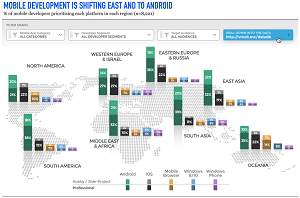News
Android Breaks Away from iOS in Race for Developer Mindshare, Report Says
- By David Ramel
- August 5, 2016
After years of a stagnant duopoly leading the race to capture developer mindshare, Android has broken away from iOS to signal the beginning of round two in the mobile OS wars, a new survey reports.
What's more, that lead is being driven by more professional developers turning to Android, which previously padded its slim advantage in reach over iOS through the support of amateurs, reported VisionMobile Ltd. in its new State of the Developer Nation Q3, 2016 report (free upon providing registration info), based on surveys of more than 16,500 respondents doing mobile, desktop, cloud and Internet of Things (IoT) development.
On the mobile side, interesting trends have been revealed over time since the survey started in 2010.
"Leaping to a new record for any platform since we started measuring, Android now has 79 percent mindshare amongst mobile developers," VisionMobile says in the report. "While Android has been ahead of iOS for almost as long as it has existed, that lead has primarily been driven by greater adoption amongst hobbyists and those building apps as a sideline. Now we see 80 percent of those building apps professionally target Android. This is also reflected in the priorities of professional developers, with Android up 7 percentage points in the last six months, 47 percent of developers now consider it their primary platform."
The survey also revealed East Coast and West Coast biases in mobile OS preferences among developers, with easterners strongly preferring Android and those in the West -- where more developers actually work -- exhibiting a slight preference for iOS.
 [Click on image for larger view.]
The Mobile OS Developer Mindshare Breakdown (source: VisionMobile)
[Click on image for larger view.]
The Mobile OS Developer Mindshare Breakdown (source: VisionMobile)
And iOS doesn't look like it's capitulating in the race, as global developer mindshare for Apple's mobile OS hasn't declined significantly, clocking in at 61 percent.
"It is the drop in these professionals prioritizing iOS that should be of much more concern: the number of professionals who consider iOS their primary platform fell 8 percentage points from 39 percent just six months ago to 31 percent in our most recent survey," VisionMobile said.
Company exec Mark Wilcox discussed the mobile trends further in a blog post just published today, titled "Android First is the New Normal."
Wilcox echoed the common perception that Android was the more egalitarian of the platforms, appealing to more developers on the strength of having more devices out in the wild, especially on the low end, and attracting more hobbyists and programming dilettantes, while iOS ruled the more lucrative high end with its popular iPhones.
"Similarly, Android's greater developer mindshare was always counterbalanced by iOS developers making the most revenue, and iOS being the primary platform for more full-time professionals," he said. "In the last six months we've seen a very significant shift on that last point. Apple will now have to work extremely hard in the next few years to avoid giving up further ground."
Wilcox said the reasons for the shift are many, including faster growth in Android-dominated regions, a change in the types of apps being developed, the increased complexity of UI-related development on iOS, changes in the design approach to app UIs on the different platforms and more.
On the plus side for Apple, Wilcox said, "It's important to note that mindshare for iOS is still within the range it has occupied for the last few years at 52 percent. Developers are not abandoning the platform. Shifting developer priorities towards Android are quite a long-leading indicator for device sales, and Apple are already making big moves to counter this trend. Swift is a boost to iOS developer productivity. Cutting app review times increases iteration speed. Apple Pay on the Web gives iOS a greater advantage in the booming mobile commerce market."
"This battle is far from over but Apple will be working a lot harder to keep developers focused on iOS than they have in the past," Wilcox concluded.
About the Author
David Ramel is an editor and writer at Converge 360.